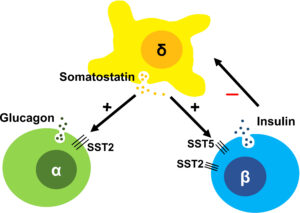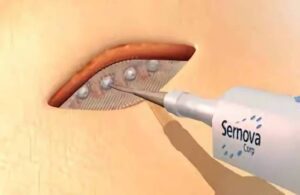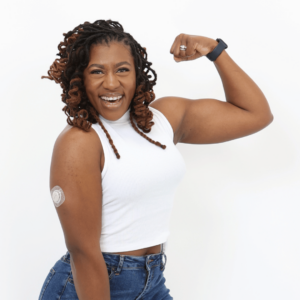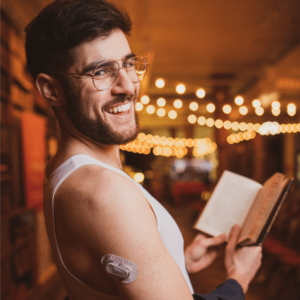It was a quiet week for diabetes news, in this issue of The Savvy Diabetic:
-
-
Somatostatin May Protect Against Sudden BG Drops
-
Sernova’s Cell Pouch Contains Vascularized, Functioning Islets > 5 years
-
A Spoonful of Laughter for dStimatize.org (diaTribe)
-
Potential strategy against blood glucose drops in type 1 diabetes by University of Gothenburg for ScienceDaily.com, 30 September 2024.
 Inhibiting the hormone somatostatin may be a new treatment strategy to prevent dangerous blood glucose drops in type 1 diabetes. This has been shown by a study conducted at, among others, the University of Gothenburg. In healthy individuals, a drop in blood glucose leads to the release of glucagon, a hormone that helps the liver produce glucose, which normalizes blood glucose levels. Glucagon has the opposite effect in the body to insulin, which lowers blood glucose. Both hormones are produced in the pancreas.
Inhibiting the hormone somatostatin may be a new treatment strategy to prevent dangerous blood glucose drops in type 1 diabetes. This has been shown by a study conducted at, among others, the University of Gothenburg. In healthy individuals, a drop in blood glucose leads to the release of glucagon, a hormone that helps the liver produce glucose, which normalizes blood glucose levels. Glucagon has the opposite effect in the body to insulin, which lowers blood glucose. Both hormones are produced in the pancreas.
People with type 1 diabetes have a lack of insulin but also glucagon. When glucagon is not released during a drop in blood glucose, it leads to dangerously low blood sugar levels, a condition that causes around 10% of all deaths in type 1 diabetes.
The current study, which is published in the journal Nature Metabolism, presents a new potential treatment strategy against dangerous blood sugar drops in type 1 diabetes, led by Patrik Rorsman, Professor of Cellular Endocrinology at the Sahlgrenska Academy at the University of Gothenburg and also active at the University of Oxford. The researchers examined groups of hormone-producing cells from the pancreas of both humans and mice. They were able to show that in type 1 diabetes, these islets are unable to release glucagon when blood sugar is low. This is because the hormone somatostatin is released in greater amounts in type 1 diabetes and inhibits the release of glucagon.
Read more: Potential strategy against blood glucose drops in type 1 diabetes
Sernova Announces New Positive Data Re Islet Survival and Function by Sernova Corp. on GlobeNewsWire.com, 12 September 2024.
Sernova Corp.announced the presentation of new positive interim data from the ongoing Phase I/II clinical trial evaluating the safety, tolerability, and efficacy of the Sernova Cell Pouch Transplant System containing donor islets in people living with type 1 diabetes (T1D). The data was presented by Piotr Witkowski, M.D., Ph.D., Professor of Surgery and Director of the Pancreatic and Islet Transplant Program at University of Chicago Medicine, at the 2024 European Association for the Study of Diabetes (EASD) Annual Meeting in Madrid, Spain.
 All 6 of the patients enrolled in Cohort A of Sernova’s Phase I/II clinical trial with Cell Pouch and donor islets achieved sustained insulin independence after combined islet transplantation into Cell Pouch and intraportally. The first patient to be treated in the trial experienced sustained insulin independence for more than 4 years accompanied by blood sugar levels in the non-diabetic range (HbA1c ≤6.5%). More than 5 years after the first islet transplant, the patient’s Cell Pouches containing the transplanted islets were removed because immune suppression had to be stopped when that patient developed other, non-diabetic health issues not related to Cell Pouch or transplanted islets.
All 6 of the patients enrolled in Cohort A of Sernova’s Phase I/II clinical trial with Cell Pouch and donor islets achieved sustained insulin independence after combined islet transplantation into Cell Pouch and intraportally. The first patient to be treated in the trial experienced sustained insulin independence for more than 4 years accompanied by blood sugar levels in the non-diabetic range (HbA1c ≤6.5%). More than 5 years after the first islet transplant, the patient’s Cell Pouches containing the transplanted islets were removed because immune suppression had to be stopped when that patient developed other, non-diabetic health issues not related to Cell Pouch or transplanted islets.
The new histological data from those explanted Cell Pouches confirmed abundant, well-vascularized, functioning islets consisting of cells producing insulin, glucagon and somatostatin, throughout all chambers, more than 5 years after being transplanted to Cell Pouch. Additionally, after being in the body for more than 5 years, a pathology examination confirmed there was no evidence of detrimental fibrotic tissue, material degradation or changes in the architecture of the Sernova Cell Pouch.
Read more: Sernova Announces New Positive Data from Phase I/II Trial Regarding Islet Survival and Function
Save the date! The Spoonful of Laughter video series is launching on October 10th by diaTribe.org.
 Comedy is a fun and engaging way to promote new cultural narratives and social change. Laughter helps increase awareness and support of messages and issues, form deeper connections with our audience (YOU!), and break down social barriers to stimulate sharing and discussion. Together we can lead people, giggling, into a kinder and more joyful future.
Comedy is a fun and engaging way to promote new cultural narratives and social change. Laughter helps increase awareness and support of messages and issues, form deeper connections with our audience (YOU!), and break down social barriers to stimulate sharing and discussion. Together we can lead people, giggling, into a kinder and more joyful future.
People with diabetes aren’t a punchline, but comedy can help us push back against harmful stigma and stereotypes and invite everyone to help us bring an end to stigma. Together, we can transform the social narrative and rewrite the story of diabetes stigma for a brighter, more joyful future.
Read more:
-
-
-
- A movement to end diabetes stigma: Destigmatize Diabetes
- Instagram: A Spoonful of Laughter
- LinkedIn: A Spoonful of Laughter
- Join the Movement: Spoonful of Laughter
-
-
Meet the Spoonful of Laughter comedians:
 Kelsey Bascom is an American writer, actress, and diabetes advocate. She is currently working on QUARTER, a coming-of-age comedy about a young woman living with Type 1 diabetes, who’s about to turn 25, as she deals with the ups and downs of her blood sugar levels and the ups and downs of her personal life.
Kelsey Bascom is an American writer, actress, and diabetes advocate. She is currently working on QUARTER, a coming-of-age comedy about a young woman living with Type 1 diabetes, who’s about to turn 25, as she deals with the ups and downs of her blood sugar levels and the ups and downs of her personal life.
 Kesha Carter, “funniest & flyest diabetic ever!” is a dynamic force in diabetes advocacy, blending her unique talents as a comedian, personal trainer, and flight attendant to inspire others living with the condition. Kesha has turned it into a powerful motivator for her advocacy, using her platform to encourage others to take control of their health, laugh in the face of challenges, and stay active.
Kesha Carter, “funniest & flyest diabetic ever!” is a dynamic force in diabetes advocacy, blending her unique talents as a comedian, personal trainer, and flight attendant to inspire others living with the condition. Kesha has turned it into a powerful motivator for her advocacy, using her platform to encourage others to take control of their health, laugh in the face of challenges, and stay active.
 Justin Eastzer, also known as “Diabetech,” is a storyteller and content creator specializing in diabetes tech, lifestyle, and news. Justin was correctly diagnosed with LADA (type 1.5) after encouragement to pursue an autoantibody test. With his background in Hollywood productions and as a Tech YouTuber, Justin now shares his journey and insights through his Diabetech YouTube channel, podcast, and social platforms.
Justin Eastzer, also known as “Diabetech,” is a storyteller and content creator specializing in diabetes tech, lifestyle, and news. Justin was correctly diagnosed with LADA (type 1.5) after encouragement to pursue an autoantibody test. With his background in Hollywood productions and as a Tech YouTuber, Justin now shares his journey and insights through his Diabetech YouTube channel, podcast, and social platforms.
 Ashley Monique is a San Francisco-based comedian who delivers wry and sometimes dark humor with a disarming, earnest energy.
Ashley Monique is a San Francisco-based comedian who delivers wry and sometimes dark humor with a disarming, earnest energy.
 Sam Morrison shares how comedy has helped him process living with type 1 diabetes and how he’s carefully integrated diabetes humor into his solo show, “Sugar Daddy.” When Sam Morrison was diagnosed with type 1 diabetes in 2021, it came with a lot of shock and a fair bit of humor. “On the initial call, [the doctor] said, ‘Your blood sugar is 600.’ And I said something like, ‘Is that bad?’” said Morrison, the young actor-comedian-writer. “My favorite part was that they said, “I think you might have some diabetes.’ I think a ‘dollop’ is the word they used,” he joked.
Sam Morrison shares how comedy has helped him process living with type 1 diabetes and how he’s carefully integrated diabetes humor into his solo show, “Sugar Daddy.” When Sam Morrison was diagnosed with type 1 diabetes in 2021, it came with a lot of shock and a fair bit of humor. “On the initial call, [the doctor] said, ‘Your blood sugar is 600.’ And I said something like, ‘Is that bad?’” said Morrison, the young actor-comedian-writer. “My favorite part was that they said, “I think you might have some diabetes.’ I think a ‘dollop’ is the word they used,” he joked.


Oh they should have reached out:
https://1drv.ms/v/c/d21a7191e168b803/EQO4aOGRcRoggNLLvgAAAAABjyTj8b1JbP-xL_F5AB-98A?e=eGQ9mJ
well maybe next year. LOL